|
|
 |
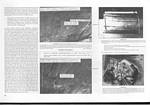 |
AUSCHWITZ:
Technique
and Operation
of
the Gas Chambers © | |
|
| |
 |
Back |
 |
Contents |
Page 488 |
 |
Home
Page |
Forward |
 |
| |
| Just beyond this room, there was a W C and a small washroom [22,
with a shower], and then the [prisoner] doctors’ room [23] with
windows [23a] looking out on the women’s camp I [B1b]. From the
corridor, a stairway [24] led up to the roof space. where there was
a domtitory [25] for the men working in the Sonderkommando and, al
the end, the electric motors [12] for the lift and the ventilation
system. |
| |
[Four motors, installed round the common chimney for
the ventilation systems, extracted the air front the undressing
room (13), the gas chamber ( I3'), the furnace room and, together,
the dissecting and “washing” rooms. Another duct (26) brought
fresh air to the gas chamber. There were also one or two other
motors for the lift, See Document 24]. |
| |
| A prisoner mechanic worked on their maintenance. Facing the
entrance gate to the crematorium grounds, in the center of the
building, was a wing [27] in which rubbish was burnt in an
incinerator [U]. It was called “Millverbrennung[sofen]” (waste
incinerator). It was separate, reached by going down a stairway [28,
still visible in the ruins]. It was surrounded by an iron platform
and was coal fired. The entrance [27a] to the waste incinerator wing
faced the crematorium access gate. [The façade of] this wing had, in
addition to its entrance door with a transom window over it, two
windows, one on the right [27b] and one on the left [27c] of the
entrance, In the left corner of the entrance, there was an opening
[27d] through which, from a walled-off area on the outside [29], the
objects to be burned were passed inside. The incineration hearth [or
hearths?] [M] for these things was [/were?] to the left of the
entrance and the firebox (G] on the right. I would point out that it
was in this particular furnace that the documents of the Political
Section of the camp were always burned. From time to time, the SS
would bring whole truckloads of papers, documents and files that had
to he burned under their control. During the incineration of these
papers, I noticed great stacks of records of dead people and death
notices ["Totenmeldung"]. We were not able to take any of these
documents because we were operating under the close and direct
surveillance of the SS. Behind the waste incinerator, at the end of
the wing, was a chimney for all the cremation furnaces and the
incinerator. At first, there were around this chimney three electric
motors used for the draught [“Saugzuganlage / suction type] forced
draught installalion” ]. Because of the heat given off and the
proximity of the incinerator, these motors often broke down. There
was even a fire on one occasion. Because of these problems, they
were later removed and the [underfloor] smoke flues of the cremation
furnaces were connected directly to the chimney. A door [27e]
allowed passage between the waste incinerator wing and the part
where the chimney was. This part being slighly higher, it was
reached by a few steps [28]. After the motors were removed some wash
basins for the Sonderkommando were installed next to the chimney
[30] [Dr Miklos Nyiszli speaks of “a beautiful ten-man shower made
of gleaming tile” (page 60), which was certainly supplied with water
heated by the incinerator], and in the other part on the opposite
side looking towards the undressing room. there was a room [31]
where Obercapo [chief Capo] August sometimes slept. Normally he
slept in the Reich Germans’ [“Reichsdeusche”] block, which was first
in Sector BIb, then in BIId. In the roof space above the waste
incinerator wing, the hair cut from the victims was dried, tossed
[An early Indian ink sketch by David Olère shows prisoners “working
the hair”. This is one of the sketches conserved by Myriam Novitch]
and put in sacks [of about twenty kilograms] which were subsequently
taken away by truck. |
|
| |
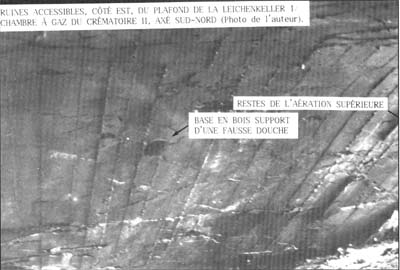 |
Document
18 |
| |
|
|
| |
Documents
18 (above) (south/north view view)
and 19 (below)
north/south view) |
|
| |
|
|
| |
Two photographs of
the accessible part of the ruins of the east side of the ceiling of
Leichenkeller 1 of Krematorium II in the region of supporting pillar
1/6. Access is at point “A” on drawing 2197. Only the wooden blocks
are still visible, each being at the the intersection of a line
running longitudinally between the central pillars and the east wall
and a perpendicular running betweeen two central pillars. 24 dummy
showerheads were fitted. |
|
| |
(Photos by the
author) |
|
| |
|
|
| |
Translation of
inscrtiptions: |
|
| |
|
|
| |
· |
RESTES DE L'AERATION SUPERIEURE
/
REMAINS OF UPPER VENTILATION DUCT |
|
| |
· |
BASE EN BOIS SUPPORT D'UNE
FAUSSE DOUCHE /
WOODEN BASE FOR DUMMY SHOWER HEAD |
|
| |
|
|
| Document 19 |
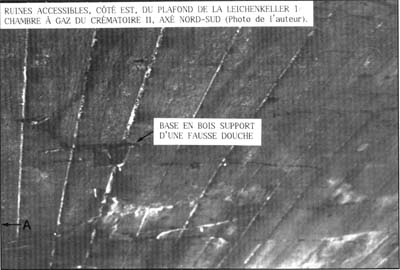 |
|
|
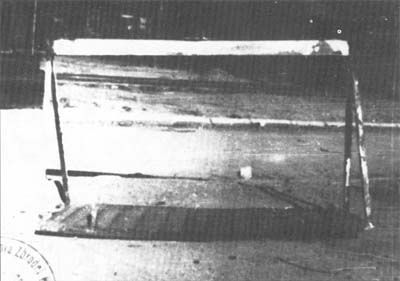 |
Document
20 |
| Document 20 |
|
| |
|
| Photograph [PMO neg. no.
205/37] of a provisional 300 kg capacity goods hoist
used in Krematorium II [9] , found in the Bauhof in 1945. The order
for its construction is to be found in the “Metal working” file,
Annex 15 of Volume 11 of the Höss trial: |
|
| |
|
"Order No 61 of 15/2/43 — POW camp Krematorium II/III
BW 30.
Subject: 1 goods lift with a minimum payload of 300 kg.
including the fitting of suitable winches, cable and motor and the
guide rail.
Order No 2563/:146:/ of 26/1/43 from the
Bauleitung.
Order taken over from the former prisoners'
metalworking shop.
Completed on 13/3/43." |
|
| It was subsequently replaced
by a 1500 kg capacity Demag goods lift. |
|
|
| Document 23 |
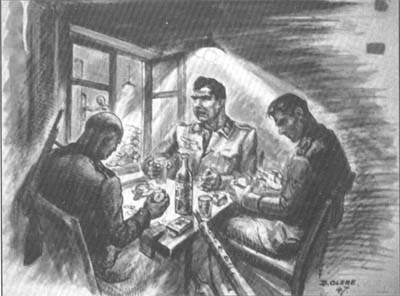 |
| |
Document 23:
|
| |
|
| |
Indian ink sketch by David
Olère, dating from 1947, showing three SS men enjoying the “left
overs” of a French convoy, in what was known as the Capo’s room of
Krematorium III [20]. while at the same time keeping an eye
on the work of the Sonderkommando through the internal window [20b]
looking out on the furnace room. If this scene had taken place in
Krematorium II, the furnace doors would have faced left and
would have been visible through the right hand side of the window.
| |
| |
AUSCHWITZ:
Technique
and operation
of the gas chambers
Jean-Claude Pressac
© 1989, The
Beate Klarsfeld Foundation |
 |
Back |
Page 488 |
Forward |
 |
|

